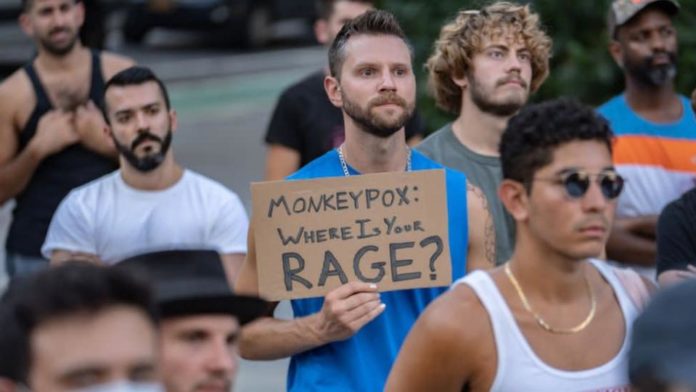
The US declared monkeypox a public health emergency late last week. It follows weeks of concern that more needs to be done to contain the virus.
On a private daily Zoom call, adult gay men who have contracted monkeypox compare notes.
They share their frustrations over trying to get tested or treated but being turned away by healthcare professionals.
They throw around tips on how to manage pain that gets worse with each new blister on your body and leaves you unable to do anything.
And, to keep from going stir-crazy as they wait for the lesions to heal, they bond over a shared experience none of them asked for.
The first US monkeypox case this year was detected on 18 May in the state of Massachusetts. Since then, more than 10,000 cases have been reported across the country, in every state except Wyoming.
Although anybody can contract the virus through direct contact with an infected person or surface, men in recent sexual contact with other men have accounted for the vast majority of cases.
Last Thursday, the federal government declared a public health emergency over the outbreak, a move that is expected to speed up the distribution of vaccines, treatments and related federal resources.
Those who’ve already endured a bout of the virus wish the help had come a lot sooner.
“It’s a very traumatic experience,” said Jeffrey Galaise, who hosts the Zoom meetings. “I’m a different person having been through this.”
“If you haven’t lived through it, you have no idea the kind of pain that this is, and the red tape that’s attached to trying to get help and support.”


The New York native, 41, began feeling sick on the day he was supposed to get his vaccine.
Currently on day 25 of the illness, he has experienced practically every symptom, from the lesions and swollen lymph nodes to an extended high fever.
Although public awareness is rising, vaccines remain in short supply and the Biden administration has said it will stretch the limited number of jabs available by administering only a fifth of one full dose.
But the virus is spreading quickly in larger states like New York, Florida and California. In San Francisco, one state senator said seeking out the vaccine feels “a little bit like the Hunger Games”, a reference to the dystopian Hollywood movie trilogy in which people fight to the death for food and supplies.
Mr Galaise also claims that information on how to treat the virus after you’ve got it is still sparse.
“People are really suffering and nobody knows what to do,” he said.
Gay men from all over the country drop in to his hour-long Zoom conversations, which have become a de facto support group and shared space for resources.
Silver Steele, an adult entertainer from Texas, has joined a couple of sessions.
His monkeypox ordeal lasted nearly a month. Lesions developed all around his mouth, making eating difficult, and he lost some 13 pounds in weight.
Aside from taking an oral anti-viral drug known as Tpoxx, which has been in short supply, “all you can really do is pain management”, he said.
Yet the 42-year-old considers himself lucky, as he has heard “horror stories” from other patients – about anal lesions that make you feel like you’re excreting needles and penile lesions that become bacterial infections of their own.
“Even though my face looked really disfigured, I didn’t have anything below the waist,” he said.
“I will gladly take it on the lip for the world to see as long as I don’t have to deal with any of that garbage.”


Monkeypox is not a new virus; in fact, it is endemic to parts of western and central Africa.
But the 2022 outbreak’s prevalence in the gay community has exposed public health flaws, as other demographics – including women and children – also now fall ill.
Yvonne Phan ran into roadblock after roadblock when she tried to get tested for monkeypox in Colorado three weeks ago.
The first doctor she spoke to misdiagnosed the large red wheals on her skin as contact dermatitis.
A sexual health clinic declined to test her, sceptical that a straight woman with no recent sexual history could have contracted the virus.
Others redirected the 33-year-old to the state’s department of public health or transferred her call to various specialists, with nobody taking an authoritative stance on what she should do.
“It was like trying to ask your mom for permission for something, and she says ‘go ask your dad’, and then your dad says ‘go ask your mom’,” said Ms Phan. “I couldn’t seem to get an answer.”
Ms Phan did test positive for monkeypox when she finally secured a swab test, but she does not know how. She still wears a mask in public and avoids large gatherings as a Covid-19 precaution. The only way she could have caught monkeypox, she claims, is from the clinic where she gets her allergy shots.
Public health experts have dragged their heels in explaining why this outbreak has affected mostly gay and bisexual men – but it has led many to draw parallels with how the gay community felt abandoned during the AIDS crisis of the 1970s and 80s.
“There’s a lot of layered issues that have come up that are very heavy,” said Mr Galaise of his Zoom conversations.
“You have people who lived through AIDS suffering from PTSD [post-traumatic stress disorder], people that are in extended isolation for 25 to 30 days, people dealing with stigma from their community.”
So patients who are already experiencing the immense pain caused by the virus have had their suffering compounded by the slow response of elected officials and public health experts, and a lack of financial and mental health resources, he said.
Silver Steele, the sex worker, documented his illness daily on social media.
Many of his posts went viral, some attracting hateful and ignorant comments, he alleged.
“So many people just look at what we’re going through and think ‘oh look, its HIV part two.”
“I noticed the emergency was declared after some children tested positive,” he continued.
“It wasn’t an emergency while it was just the gay guys.”







